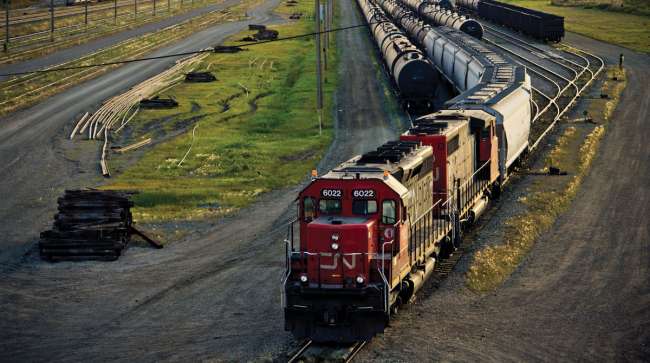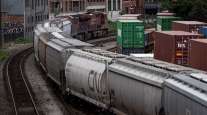Staff Reporter
Canadian Labor Board Leaves Door Open for Rail Strike

[Stay on top of transportation news: Get TTNews in your inbox.]
The Canada Industrial Relations Board has kept the door open for a major railway strike amid continuous labor negotiations Aug. 9.
Canadian National Railway Co. and Canadian Pacific Kansas City have been negotiating with the Teamsters Canada Rail Conference. The ruling found that a work stoppage between the two sides would not pose an immediate threat to public health and safety, meaning a rail strike could occur as soon as Aug. 22.
“Serious concerns were raised about potential impacts to the health and safety of Canadians,” Labor Minister Steven MacKinnon said in a statement. “The parties in this dispute have a responsibility to Canadians. I call upon the parties to stay at the bargaining table and continue holding productive and substantive discussions that meet the needs of this moment.”
The CIRB has imposed a 13-day cooling-off period before a work stoppage can occur. The inquiry was in response to a ministerial request to assess if Canadian National, CPKC and TCRC should maintain any of their activities in the event of a strike or lockout. CPKC responded to the decision by issuing a notice to the union about a planned lockout Aug. 22.
“CPKC is committed to continuing good faith negotiation throughout,” CPKC said in a statement. “All stakeholders want an end to this needless uncertainty as rapidly as possible so that we can continue serving the North American economy. Stability could be restored today if the TCRC would accept CPKC’s offer to resolve the current labour dispute through binding interest arbitration.”

MacKinnon
CPKC said it would have no choice but to institute a lockout if no resolution is reached during the cooling-off period and union officials continue to refuse binding interest arbitration. The company also noted that it’s trying to protect the supply chain from a more widespread disruption. Canadian National formally requested intervention by the minister of labor.
“No progress has been made as the TCRC has not engaged meaningfully at the negotiating table,” Canadian National said in a statement. “While CN is willing to keep negotiating with the TCRC, the company has lost faith in the process and is concerned that a negotiated deal is no longer possible without a willing partner.”
Canadian National added that it would have to begin a phased and progressive shutdown of its network unless meaningful progress is made. The company noted that it has made four separate offers to the union this year that included wages, rest and labor availability provisions.
“The board has decided that a work stoppage at either carrier would not result in such an immediate and serious danger,” TCRC leadership said in a signed letter. “This verifies that the agreements previously entered were proper and appropriate. The TCRC considers this a successful decision that confirms the membership’s rights to withdraw services if required.”
TCRC leadership also noted in the letter that it will continue to push for a negotiated settlement with both carriers. The union views the decision as strengthening the resolve of its bargaining committee to achieve a settlement.

Shannon
“The first thing to understand about this potential strike is the historic nature of it,” said Scott Shannon, vice president for Canada at C.H. Robinson. “We’ve been doing business in Canada for over 100 years, and it’s the first time labor negotiations for both railroads have been on the same timeline. Before, when one railroad went on strike, freight could be shifted to the other.”
Shannon added that a railroad strike would impact companies in both the U.S. and Canada. C.H. Robinson data shows that about 70% of freight between cities in Canada moves by rail. The U.S. is Canada’s largest trading partner, and a significant portion of cross-border freight relies on rail transportation. A strike could have far-reaching consequences for both countries.
“In anticipation of possible strikes, we’ve already been diverting much of our U.S. customers’ ocean cargo away from Canadian ports,” Shannon said. “We helped some customers take that measure right away when the first strike vote happened in May. Once Canada’s Industrial Relations Board stepped in, some went back to shipping through Canadian ports.”
RELATED: Rail Strike Averted as Unions Agree to Deal
C.H. Robinson has also been working to line up extra trucking capacity on both sides of the border. The company handles about 650,000 cross-border shipments between Canada and the United States a year. Shannon noted that trucks fill up fast even when something like regional flooding or forest fires disrupts the railroads.
“Both the Canadian Class I’s and the Teamsters union are reportedly back to the negotiating table this week,” TD Cowen analyst Jason Seidl said. “On their earnings call last week, however, CPKC noted that both parties were far from striking an agreement and the CEO saw a strike as the likely outcome. We continue to monitor developments though note that if a stoppage does occur, freight shift to the U.S. network could intensify. We would view a shift in freight as largely temporary.”
C.H. Robinson ranks No. 2 on the Transport Topics Top 100 list of the largest logistics companies in North America.
Want more news? Listen to today's daily briefing below or go here for more info:




